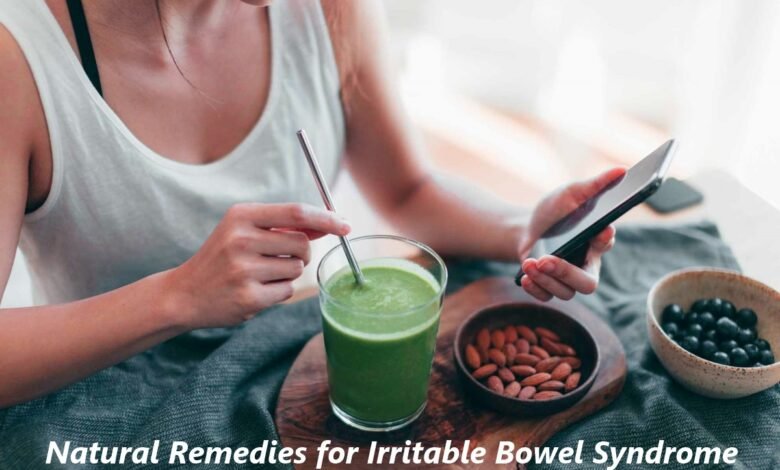9 Best Natural Remedies for Irritable Bowel Syndrome 2023

Irritable bowel syndrome (IBS) is a common digestive disorder that can cause significant discomfort and affect the quality of life for those who experience it. While there is no known cure for IBS, there are various natural remedies that can help manage its symptoms effectively. In this article, we will explore nine of the best natural remedies for irritable bowel syndrome, focusing on their benefits and how to incorporate them into your daily routine.
Living with irritable bowel syndrome can be challenging, but there is hope for finding relief through natural remedies. These remedies aim to soothe the digestive system, reduce inflammation, and alleviate common IBS symptoms such as abdominal pain, bloating, diarrhea, and constipation. By incorporating these remedies into your lifestyle, you may experience a significant improvement in your overall well-being.
Read More: 7 Benefits of Detoxing for Gastrointestinal Health
Peppermint Oil

Peppermint oil is a popular natural remedy for IBS due to its ability to relax the muscles of the gastrointestinal tract. The active compound in peppermint oil, menthol, has been found to reduce spasms and alleviate pain associated with IBS. You can take peppermint oil in enteric-coated capsules or enjoy a warm cup of peppermint tea for relief.
Ginger
Ginger has long been used as a natural remedy for various digestive ailments, including IBS. It possesses anti-inflammatory and analgesic properties that can help reduce inflammation and pain in the gastrointestinal tract. Incorporating ginger into your diet can be as simple as adding fresh ginger to your meals, drinking ginger tea, or taking ginger supplements.
Probiotics
Probiotics are beneficial bacteria that play a crucial role in maintaining a healthy gut microbiome. They can help restore the balance of gut bacteria, alleviate IBS symptoms, and improve overall digestive health. Look for probiotic supplements containing strains like Bifidobacterium and Lactobacillus, which have shown positive effects in managing IBS symptoms.
Aloe Vera

Aloe vera is a well-known plant with a long history of medicinal use. It has gained popularity for its soothing properties on the skin, but it can also provide relief for individuals suffering from irritable bowel syndrome (IBS). IBS is a chronic gastrointestinal disorder that affects the large intestine, causing symptoms such as abdominal pain, bloating, diarrhea, and constipation. While there is no cure for IBS, there are natural remedies like aloe vera that can help manage its symptoms effectively.
Chamomile
Chamomile, a well-known herb, has been used for centuries for its soothing and calming properties. It is not only popular as a relaxing tea but also as a natural remedy for various ailments, including digestive disorders like irritable bowel syndrome (IBS). IBS is a chronic condition that affects the large intestine, causing abdominal pain, bloating, and changes in bowel movements. Incorporating chamomile into your daily routine may provide relief from these uncomfortable symptoms.
Turmeric

Turmeric contains an active compound called curcumin, which has potent anti-inflammatory properties. These properties make turmeric a valuable natural remedy for managing IBS symptoms, as inflammation often contributes to discomfort and pain. Incorporate turmeric into your diet by adding it to your meals or consuming it as a supplement.
Fiber
Dietary fiber plays a crucial role in maintaining a healthy digestive system and can be especially beneficial for individuals with IBS. It helps regulate bowel movements and can ease both constipation and diarrhea. Increase your fiber intake by including fruits, vegetables, whole grains, and legumes in your diet.
Slippery Elm
Slippery elm is an herbal remedy that has a soothing effect on the digestive tract. It forms a protective coating along the gastrointestinal lining, reducing inflammation and relieving IBS symptoms such as abdominal pain and diarrhea. You can find slippery elm in the form of powder or capsules, and it is typically mixed with water and consumed before meals.
Lifestyle Modifications
In addition to natural remedies, certain lifestyle modifications can greatly improve IBS symptoms. Managing stress through techniques such as meditation, deep breathing exercises, and regular exercise can help reduce flare-ups. Additionally, ensuring you get enough sleep and staying hydrated throughout the day can contribute to better overall digestive health.
Conclusion
Living with irritable bowel syndrome doesn’t have to be a constant struggle. By incorporating these nine natural remedies into your routine and making necessary lifestyle modifications, you can effectively manage your IBS symptoms and improve your overall well-being. However, it’s important to remember that everyone’s experience with IBS is unique, and what works for one person may not work for another. It may take some trial and error to find the remedies and lifestyle adjustments that provide the most relief for you. Consult with a healthcare professional for personalized advice and guidance.
Read More: 11 Best Natural Remedies for Allergies
FAQs
Are these natural remedies a substitute for medical treatment?
No, these natural remedies should not be seen as a substitute for medical treatment. It’s important to consult with a healthcare professional for a proper diagnosis and to discuss any natural remedies you plan to incorporate.
Can I take peppermint oil if I have acid reflux?
Peppermint oil may relax the lower esophageal sphincter, potentially exacerbating acid reflux symptoms. It’s best to consult with a healthcare professional before using peppermint oil if you have acid reflux.
How long does it take to see results from probiotics?
The effects of probiotics can vary from person to person. Some individuals may experience improvements in symptoms within a few weeks, while others may require several months. Consistency is key, and it’s recommended to take probiotics regularly for optimal results.
Can I use aloe vera gel instead of juice for IBS relief?
While aloe vera gel may provide some benefits, aloe vera juice is specifically formulated for internal consumption and is often preferred for digestive issues like IBS. It’s important to choose a high-quality, pure aloe vera juice for the best results.
Are there any side effects of consuming turmeric?
Turmeric is generally safe for most people when consumed in moderation. However, high doses or long-term use may cause gastrointestinal issues or interact with certain medications. If you have any concerns, it’s best to consult with a healthcare professional before incorporating turmeric into your routine.







